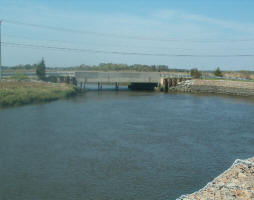 Greece: Fertilisers linked to contaminated drinking water in Evros
Greece: Fertilisers linked to contaminated drinking water in Evros
In a new study, samples of drinking water from the north-east of Greece have been found to exceed European limits for nitrates, sulphates and phosphates - chemicals that are linked to health problems such as reproductive disorders and cancer. The research has produced a map of the Evros area showing the location of 64 water sampling sites and found that pollution levels are highest in areas with the most intensive agriculture. Furthermore, water can remain chronically contaminated long after fertiliser use has been reduced.
One of the largest agricultural areas in north-eastern Greece, the Evros region covers over 1.5 million acres of cultivated land. Many of its drinking water resources are derived from underground aquifers that lie within agricultural areas.
The use of fertilisers such as ammonium nitrate, ammonium sulfate and inorganic phosphate in Greece increased dramatically from 158,724 tonnes in 1961 to 696,000 tonnes in 1990. Globally, the use of nitrogen and phosphorus fertilisers increased around 8 fold and 3.5 fold respectively between 1960 and 2000. As only between 30-60 per cent of nitrate and 45 per cent of phosphate fertilisers are taken up by crops, a significant amount of these nutrients leaks from agricultural fields.
Major environmental and public health concerns arise from increasing use of fertilisers, for example, raised nitrate levels have been linked to conditions such as reproductive problems, cancer, the kidney disorder endemic nephropathy and the blood disorder methemoglobinaemia. With the introduction of the European Water Directive concerning the protection of waters against pollution by nitrates from agricultural sources in 19911, there has been a significant reduction in fertiliser usage.
However, the researchers believe this study demonstrates that aquifers in the Evros region are still affected by chronic contamination. Tap-water samples collected from 64 different locations were analysed for the presence of nitrates, nitrites, ammonium, sulfate and phosphate. In four out of 64 sites (6.25 per cent) drinking water samples exceeded the European nitrate limit of 50 ppm, and 17.2 per cent showed values between 25 and 50 ppm. Around 7.8 per cent of samples exceeded the European recommended value of 5 ppm of phosphates (EEC 1998). Sulfate levels exceeding the recommended limits of 250 ppm were found in 4.7 per cent of sampling points.
According to the researchers, the study shows that the deterioration of water quality in this area is directly linked to the use of agricultural fertilisers. Levels of these pollutants in tap water have remained high even after fertiliser use was reduced, indicating that underground aquifers are still contaminated. The study has identified some areas in the region not previously thought to be at risk where drinking water is close to nitrate limits set by the European Water Directive. The information could be used to prevent over-exposure of the public to pollutants by regulating the supply of contaminated water to these nitrate vulnerable zones (NVZ).
- For more information on EC Directives 91/976 (EEC 1991) concerning the protection of waters against pollution by nitrates from agricultural sources and 80/778 (EEC 1980) relating to the quality of water intended for human consumption visit: http://ec.europa.eu/environment/water/water-nitrates/directiv.html
| Contact information |
Email: avantar@med.duth.gr |
|---|---|
| News type | Inbrief |
| File link | n/a |
| Source of information | Nikolaidis, C., Mandalos, P. and Vantarakis, A. (2008). Impact of intensive agricultural practices on drinking water quality in the EVROS Region (NE GREECE) by GIS analysis. Environmental Monitoring and Assessment. 143(1-3): 43-50. |
| Keyword(s) | EU-WFD |
| Subject(s) | AGRICULTURE , ANALYSIS AND TESTS , CHARACTERISTICAL PARAMETERS OF WATERS AND SLUDGES , DRINKING WATER , DRINKING WATER AND SANITATION : COMMON PROCESSES OF PURIFICATION AND TREATMENT , HEALTH - HYGIENE - PATHOGENIC MICROORGANISM , PREVENTION AND NUISANCES POLLUTION , SANITATION -STRICT PURIFICATION PROCESSES , WATER QUALITY |
| Relation | http://ec.europa.eu/environment/water/water-nitrates/directiv.html |
| Geographical coverage | Greece |
| News date | 19/09/2008 |
| Working language(s) | ENGLISH |
 you are not logged in
you are not logged in





